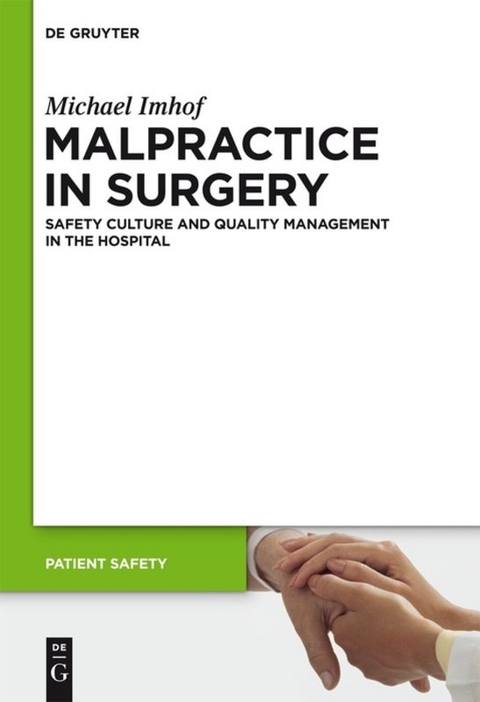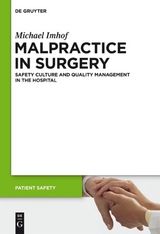Malpractice in Surgery
Safety Culture and Quality Management in the Hospital
Seiten
2012
De Gruyter (Verlag)
978-3-11-027132-4 (ISBN)
De Gruyter (Verlag)
978-3-11-027132-4 (ISBN)
New Series: Patient Safety Medical errors do not only occur in the laboratory, but pose a direct threat to patient safety. The clinical laboratory is an integral part of care, and the results of analytics are an essential component of informed decision-making for clinicians. Efforts to avoid laboratory errors, especially minimizing pre- and postanalytical errors, are in the responsibility of laboratory professionals.The new handbook series with the international known editors Oswald Sonntag and Mario Plebani fills a vacancy in the relevant and promising area of patient safety and quality assurance.
Tentative estimates suggest that one in ten patients suffers from an adverse event in hospital. In Germany, approx. 1.8 million out of approx. 18 million inpatients suffer from adverse events; 50 percent of these cases are estimated to be avoidable. In the US, nearly 100,000 people die from the consequences of mistreatment. The intensive care units record 1.7 medical errors per patient and day. The most affected disciplines are the operative disciplines, particularly general surgery. Medical errors mainly occur when the indication for surgery is being made, during surgery and post-surgery. Suspicious oncological diagnostic results and post-operative complications are also often ignored. This book deals with complications and typical medical errors in surgery. It shows solutions and ways of dealing effectively with these errors and how to establish an efficient security management system.
Tentative estimates suggest that one in ten patients suffers from an adverse event in hospital. In Germany, approx. 1.8 million out of approx. 18 million inpatients suffer from adverse events; 50 percent of these cases are estimated to be avoidable. In the US, nearly 100,000 people die from the consequences of mistreatment. The intensive care units record 1.7 medical errors per patient and day. The most affected disciplines are the operative disciplines, particularly general surgery. Medical errors mainly occur when the indication for surgery is being made, during surgery and post-surgery. Suspicious oncological diagnostic results and post-operative complications are also often ignored. This book deals with complications and typical medical errors in surgery. It shows solutions and ways of dealing effectively with these errors and how to establish an efficient security management system.
Michael Imhof, Office for Medical and Scientific Expert Assessments, Würzburg, Germany.
| Erscheint lt. Verlag | 13.12.2012 |
|---|---|
| Reihe/Serie | Patient Safety ; 6 |
| Übersetzer | Constantijn Blondel |
| Zusatzinfo | 1 b/w ill., 15 b/w tbl. |
| Verlagsort | Berlin/Boston |
| Sprache | englisch |
| Maße | 170 x 240 mm |
| Gewicht | 365 g |
| Themenwelt | Medizin / Pharmazie ► Medizinische Fachgebiete ► Anästhesie |
| Medizin / Pharmazie ► Medizinische Fachgebiete ► Chirurgie | |
| Studium ► 2. Studienabschnitt (Klinik) ► Anamnese / Körperliche Untersuchung | |
| Wirtschaft ► Betriebswirtschaft / Management ► Logistik / Produktion | |
| Schlagworte | Behandlungsfehler • Chirurgie • Kunstfehler (Medizin) • malpractice • Malpractice; Surgery; Medical Quality Management • Medical Quality Management • Operative Fächer • Patientensicherheit • Qualitätsmanagement • Surgery |
| ISBN-10 | 3-11-027132-X / 311027132X |
| ISBN-13 | 978-3-11-027132-4 / 9783110271324 |
| Zustand | Neuware |
| Haben Sie eine Frage zum Produkt? |
Mehr entdecken
aus dem Bereich
aus dem Bereich
aus Klinik und Praxis
Buch | Softcover (2023)
Urban & Fischer (Verlag)
CHF 58,75
Buch | Hardcover (2017)
Hogrefe (Verlag)
CHF 77,00
Buch | Softcover (2024)
Urban & Fischer in Elsevier (Verlag)
CHF 78,40




